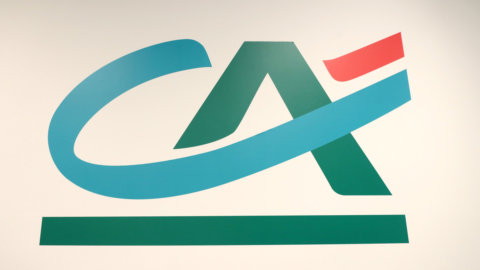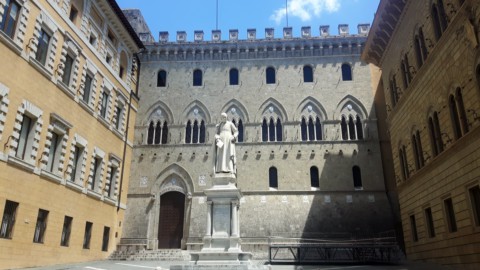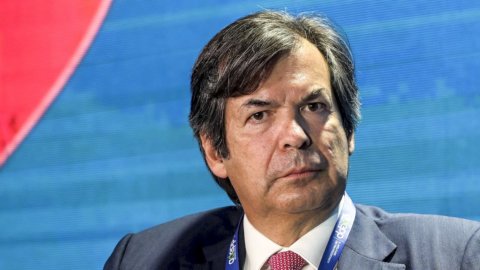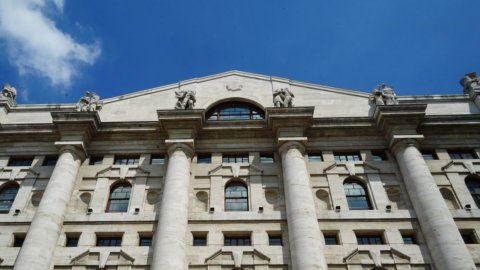Under the pressure of the falling dollar, the map of the crisis is changing. The US locomotive sends conflicting signals: the trade balance worsens more than expected, while the services index, better than expected, has allowed the markets to limit losses. The day, however, closed with a notable drop: the S&P index lost 1%, the biggest drop since 8 March. The Nasdaq did the same. Damage limits the Dow Jones with -0,75%.
Barack Obama can claim victory: Pfizer (+2%) has announced the withdrawal of the 160 billion dollar merger operation with Allergan (-15%) after the restrictions imposed by Washington on the tax advantages of tax inversion (i.e. emigration towards more generous tax legislation). Meanwhile, the race for the White House is getting complicated. In Wisconsin Ted Cruz interrupted Donald Trump's winning streak, but above all Bernie Sanders won another challenge with Hillary Clinton.
OIL RAISES ITS HEAD
The increase in oil prices conditioned the session: Brent +1,6% to 38,48 dollars a barrel, Wti +2,5% to 36,75 dollars. Bloomberg reported that crude inventories in the United States are expected to have fallen by 4 million barrels last week. Kuwait's representative inside OPEC said that there are no alternatives for oil producers, who are increasingly on the ropes with these quotations: on April 17, in Doha, they will be forced to find some form of agreement on the production freeze , with or without Iran.
CHINA RAISES ITS HEAD AS THE TOKYO CRISIS IS WORSENING
The slowdown in US exports makes it increasingly difficult to raise rates. Meanwhile, the weakness of the US currency is bearing the first good fruits for the Chinese economy: in March, for the first time in 11 months, the PMI index rose well above 50 in both services and manufacturing. Hence the recovery this morning of the Shanghai (+0,3%) and Shenzhen (+0,9%) stock exchanges. Hong Kong (+0,4%) and Australia (+0,5%) also rose.
Tokyo still weak (-0,1%) victim of the rush of purchases on the yen: the exchange rate with the dollar has fallen below the 110 barrier for the first time in 17 months. Shinzo Abe, furious, warned the countries that drive the exchange rate downwards. But the Bank of Japan is perceived as impotent. And so the higher the yen, the more local and global equities suffer. And risk aversion fuels further strength of the currency.
MILAN STILL BLACK JERSEY IN EUROPE: -3%
The Eurozone is also suffering from the currency situation: the euro trades at 1,1376 against the dollar, not far from the highs of the last 6 months. The strength of the single currency, combined with the purchases of the ECB generate new downward pressure on interest rates: the more they fall, the more the market attacks European banks, believing that this worsens their profitability prospects.
In Milan, the FtseMib index fell by 3% to 17109 points, once again bringing up the rear with widespread declines in all sectors. The London Stock Exchange lost 1,1%, Paris -2,1%, Frankfurt -2,6%. Futures promise a positive start for Old Continent stock exchanges: London +28 points, Frankfurt +26, Cac +27.
GERMANY HOLDS BACK, THE BUND RETURNS LESS THAN 1%
The negative data from industry in Germany weighed on the European stock markets: factory orders fell in February by 1,2% on the previous month, against a growth forecast of 0,3%. Even the PMI Composite index elaborated by Markit through interviews with the purchasing managers of a sample of companies, both industrial and services, performed worse than expected.
Pessimism on growth fueled the race for the 0,098-year Bund which fell to a yield of 0,13%, on last year's lows, from XNUMX% the day before.
BTP ITALIA, GOOD BUT NOT TOO MUCH: YESTERDAY 1,4 BILLION INFLOWS
The second day of the offer reserved for retail for the new BTP Italia 1,421, indexed to national inflation and with a guaranteed minimum annual coupon rate of 2024%, closed with orders for 0,40 billion, bringing total requests to 3,729 billion billion.
The latter amount is lower than that totaled on the second day of the offer of the security with the same characteristics – but with a coupon rate of 0,50% – launched last year, equal to 4,851 billion. Operators estimate an amount of between 7 and 8 billion for the entire issue, against the 9,4 billion of the one launched in 2015. “I don't think we will deviate much from last year's retail results (5,4 billion )” said Maria Cannata, head of the public debt.
PALAZZO CHIGI AT THE BEDSIDE OF THE BANKS
“In Italy we have our own vicious circle – comments Giuseppe Sersale, strategist of Anthilia – some banks, currently Vicenza and Banco Popolare (and later Veneto Banca), have to raise capital. But in this context it is increasingly difficult to find subscribers, because the capital increases, made mandatory by the regulators, become increasingly dilutive and/or onerous in perspective".
The extraordinary summit on banks yesterday morning at Palazzo Chigi tried to remedy the problem, introduced by Prime Minister Matteo Renzi, with the aim of creating a private vehicle that could be used to address the problems of some Italian institutions, either to guarantee any increases or to manage the transfer of non-performing loans. But the summit, which was attended by the leaders of the CDP and the three most important Italian institutions (Intesa, Unicredit and Ubi), as well as the governor Vincenzo Visco and the minister Pier Carlo Padoan, did not produce an operational solution. "On the table is the hypothesis of a vehicle containing CDPs, foundations, funds, private investors, pension funds".
BANCO POPOLARE -7,3% IS NOW WORTH LESS THAN 2 BILLION
In the meantime, the shooting of the banks continued in Piazza Affari. The Stoxx sector index lost 3,1%. Banco Popolare fell by 7,3% below the 5 euro level, to its lowest ever. Capitalization drops below 2 billion euros for the first time, the loss since the beginning of 2016 widens to 65%. The fall of Banca Popolare di Milano was also heavy (-6%). The two banks have announced an integration plan which provides for a capital increase of 1 billion euro. Monte Paschi leaves 4% on the ground.
The crash did not spare the institutes interviewed by Matteo Renzi: Unicredit loses 3%, Intesa Sanpaolo -3%, Monte Paschi -4%, Ubi Banca -5%. Discounts also for savings companies. Banca Mediolanum (-3,9%) aims to distribute a dividend of 30 cents also for the current year, in line with 2015, even if the net result for the year were lower. Soul-4,1% and Banca Generali -6%.
FINMECCANICA CLOSES DEAL IN KUWAIT
In the midst of the storm falls the announcement of contracts of great strategic value. Finmeccanica -1,6% at the end of the day despite signing the contract for supply to Kuwait of Typhoon fighter aircraft. The agreement provides for the supply of 28 combat aircraft built by the Eurofighter consortium, which also includes the Finmeccanica group. The contract is worth around 7-8 billion euros for the entire consortium. For the Italian holding company, as prime contractor, it could be a slice of around 3,5/4 billion. Among the industrialists, StM (-5%) and Prysmian (-3,4%) also lost ground.
ENEL ADVANCES ON BROADBAND. THUD OF MEDIASET
Today, an agreement could be reached between Enel (-3,3%), Wind and Vodafone to create a commercial partnership on ultra-broadband. A project that involves the fiber cabling of about 250 cities. It will be a [ub1] three-way agreement of a commercial nature which will be presented at Palazzo Chigi at the press conference on Thursday morning.
Telecom Italia still suffers (-2,5%), which risks being displaced by an agreement on Metroweb between Cdp, F2i and perhaps by Fastweb, which has declared its intention to maintain its share in the capital of the Milanese company. Mediaset loses 5% and falls to 3,4740 euros. Given the stock exchange's reaction, it is unlikely that the agreement with Vivendi will be signed as early as today.
SHIFT THE AUTOMOTIVE. FIAT -5% INVESTS IN ARGENTINA
Bad day also for the automotive sector (-3,3% for the sector index). Peugeot (-6%) drags down the European industry. The French manufacturer announced yesterday that in the three-year period 2016-2018 revenues will grow by 3,2%, but the operating margin target falls below expectations.
Fiat Chrysler loses 5%. Sergio Marchionne, announced yesterday in front of the Argentine president Mauricio Macri a 500 million dollar investment plan for the Cordoba plant. The objective is the production of a totally new model destined for the Latin American markets. The launch of the new model is expected in the second half of 2017.
SAIPEM WORST NON-BANKING STOCK
The decline has not spared the oil companies. Eni loses 2,7%, Tenaris 4,8%. Saipem does worse (-5,78%), worst blue chip of the day if banks are not taken into account. Mediobanca announced that it has resumed coverage of the stock with a Neutral recommendation and a target price of €0,37.




